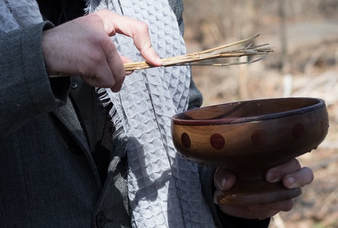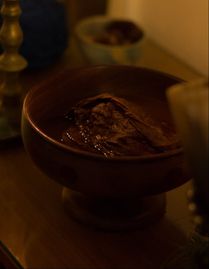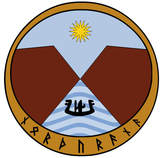Blóts & Ceremonies
Our kindred performs several Heathen faith services:
Birth & Naming | Welcoming | Coming-of-Age | Marriage | Funeral & Memorial
Birth & Naming | Welcoming | Coming-of-Age | Marriage | Funeral & Memorial
In addition, the North River Kindred observes Heathen holidays and notable observances through an annual series of blóts.
Though the majority of our blóts remain private affairs, we do preside over and officiate ceremonies that are held in public space and welcome all who seek to know the gods in frith and kinship.
If you are able to attend our ceremonies, please review our Ritual Etiquette.
We do not adhere to one specific Heathen tradition. Our ritual themes may span from Ásatrú, Anglo-Saxon, or Urglaawe.
Though elements may differ, there several key components that remain constant:
Though the majority of our blóts remain private affairs, we do preside over and officiate ceremonies that are held in public space and welcome all who seek to know the gods in frith and kinship.
If you are able to attend our ceremonies, please review our Ritual Etiquette.
We do not adhere to one specific Heathen tradition. Our ritual themes may span from Ásatrú, Anglo-Saxon, or Urglaawe.
Though elements may differ, there several key components that remain constant:
Blessing of the Horn
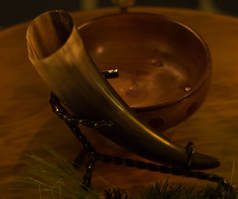
The drinking horn is a staple of Heathen ritual and is often blessed at the start of a ceremony.
It is most commonly filled with mead (honey wine), although beer and cider are popular as well.
Non-alcoholic substitutes such as malt beer, non-alcoholic cider, and even Gaterade (Loki blóts are weird) are notable substitutes.
When attending a ritual it is perfectly acceptable to ask what the "flavor of the month" is!
It is most commonly filled with mead (honey wine), although beer and cider are popular as well.
Non-alcoholic substitutes such as malt beer, non-alcoholic cider, and even Gaterade (Loki blóts are weird) are notable substitutes.
When attending a ritual it is perfectly acceptable to ask what the "flavor of the month" is!
Hailing
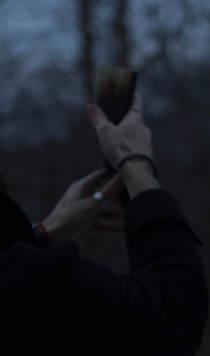
Following the blessing of the horn, libation is then offered into a bowl for each of the following to:
We honor our ancestors first.
Those both of our blood and beyond our blood who are responsible for our existence.
Secondly, we honor the land-spirits (Landvættir).
It is upon their abode that we make our home, go to work, and live our lives.
Lastly, we honor the gods.
Their powers and aspects fashioned and impact our world.
The specific deities honored during ceremony vary upon on the occasion.
- Honor the Ancestors
- Honor the Land-Spirits
- Honor the Gods
We honor our ancestors first.
Those both of our blood and beyond our blood who are responsible for our existence.
Secondly, we honor the land-spirits (Landvættir).
It is upon their abode that we make our home, go to work, and live our lives.
Lastly, we honor the gods.
Their powers and aspects fashioned and impact our world.
The specific deities honored during ceremony vary upon on the occasion.
Sumble
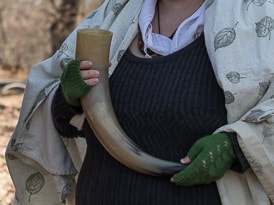
Sumble (or Symbel) forms the central working of our blóts.
It is the act of passing the filled horn around the community.
The horn in Sumble is a sacred representation of the Well of Wyrd; whereby all words and deeds are recorded and kept. So speak well and speak true.
Be respectful of others and do not speak over them.
The number and occasion of rounds vary depending on ritual context; however when the horn is passed to a participant they may offer words for the round prior to drinking.
If ill or pregnant (if alcoholic beverage is used) you may offer to kiss the horn instead.
It is the act of passing the filled horn around the community.
The horn in Sumble is a sacred representation of the Well of Wyrd; whereby all words and deeds are recorded and kept. So speak well and speak true.
Be respectful of others and do not speak over them.
The number and occasion of rounds vary depending on ritual context; however when the horn is passed to a participant they may offer words for the round prior to drinking.
If ill or pregnant (if alcoholic beverage is used) you may offer to kiss the horn instead.
Asperging
|
Asperging is the act of receiving the blessings, and is done at the completion of all central work pertinent to the blót or ceremony that is being performed.
It is typically done by dipping a sprig into the bowl where the liquid offerings have been poured into and then sprinkling the liquid onto the hands or face. Don't worry, you get to choose which one! For infants or young children a dab from the bowl upon their forehead will suffice. It is also most often used as such during a Birth & Naming ceremony. |
Earthing
|
The final act done in our blóts and ceremonies is the pouring of our collective offerings to the earth.
We chant the following verse graciously borrowed from Raven Kindred North: "From the Gods, to the Earth, to us.
From us, to the Earth, to the Gods. A gift for a gift." |
Additional Elements
Music Language
|
Thanks largely to our "kindred skald" Will, the kindred sometimes uses music as a ritualistic tool to bring focus as part of our ritual framework.
This may take the form of a musical signal at the beginning of a rite to call to gather, as well as a portion of central working in the form of a chant (galdor) or song. With the understanding that not everyone will be familiar with the songs or chants, printed sheets will be provided by the ritual officiant. |
Language is a powerful tool that connects and transports us to a time and place that has been long forgotten.
In Heathen rituals, Germanic language such as Old Norse, Icelandic, Anglo-Saxon, and Deitsch (Pennsylvania Dutch) are often used in the form of phrases, chants, songs, and/or prayers. Without expecting everyone to understand these languages, an English translation will always follow foreign language usage and a printed copy may be supplied to participants by the ritual officiant. |
